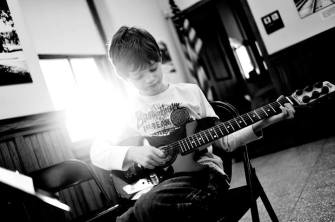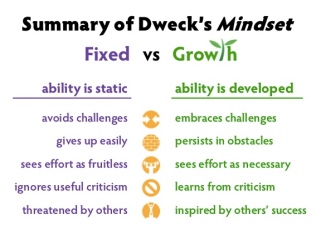“Skills and abilities only develop when knowledge is applied directly and used creatively in meaningful situations, not on multiple choice tests. This is as true for basketball and piano playing as it is for cooking, reading, karate, mathematics, parenting, democratic decision-making and brain surgery.”
 Think about a young child, or any talented athlete, artist, scientist and musician. How did they develop their skills and understandings? Those who have studied successful mastery describe a common path and process that is followed, one that requires practice, effort, patience, creativity and concentration.
Think about a young child, or any talented athlete, artist, scientist and musician. How did they develop their skills and understandings? Those who have studied successful mastery describe a common path and process that is followed, one that requires practice, effort, patience, creativity and concentration.
Take the example of language learning. All children are born with the potential to learn new languages, they have brains that we might compare to “language learning” hardware in a computer. Over time they master the specific language of those who surround them, what we might compare to software.
 But this is where the similarity between machines and humans ends. With a computer you simply transfer the data from one location to another. With human beings new information cannot be downloaded, knowledge must be practiced and applied in meaningful situations, so that lasting comprehension and skills are “self-constructed” in the brain.
But this is where the similarity between machines and humans ends. With a computer you simply transfer the data from one location to another. With human beings new information cannot be downloaded, knowledge must be practiced and applied in meaningful situations, so that lasting comprehension and skills are “self-constructed” in the brain.
Learning isn’t mechanistic, it’s creative and organic. Skills and knowledge cannot be transferred, they must be grown and mastered– through creative application, imitation and concentrated effort.
This is why well-designed sports, music and arts programs are so important in education. They serve to focus a young person’s attention on the essential elements of the mastery process, help learners understand the importance of hard work and what psychologist Carol Dweck calls a growth mindset.
 This is also why feeding students decontextualized information on its own and then testing their levels of retention is a dead end in terms of learning and education. While a computer can retain information that doesn’t mean it knows how to use it.
This is also why feeding students decontextualized information on its own and then testing their levels of retention is a dead end in terms of learning and education. While a computer can retain information that doesn’t mean it knows how to use it.
Skills and abilities only develop when knowledge is applied directly and used creatively in meaningful situations, not on multiple choice tests. This is as true for basketball and piano playing as it is for cooking, reading, karate, mathematics, parenting, democratic decision-making and brain surgery.
Our comprehension about something new deepens as knowledge is activated and applied. This is why concentration, effort and long-term practice are so essential. There is no way to bypass this process, because we are creative living beings, not machines.
Children understand this, intuitively. During the first years of their lives they learn quickly and informally- mastering their parent’s language, discovering how to walk, run, paint, play, sing and dance. In their early years learning is a source of great joy for them.
 The mastery path of learning was well understood by our ancestors, both in the West and the East. In Europe, artisans and craftsmen have always trained new apprentices in this way. Likewise, traditional Eastern arts education places great importance on this process.
The mastery path of learning was well understood by our ancestors, both in the West and the East. In Europe, artisans and craftsmen have always trained new apprentices in this way. Likewise, traditional Eastern arts education places great importance on this process.
All of us learned this way, initially. Moreover, once a learner understands the mastery process he or she can apply this approach to any challenge or task. Something new then becomes an opportunity to test and improve one’s knowledge and skills.
This is why young children come to new things with such confidence and excitement. They are more motivated to learn because they already understand how the path and process involved can be interesting and enjoyable.
It is for this reason that wise parents and educators place more value on mastery-oriented character traits and positive attitudes toward learning then achievements and test scores.
 A child equipped with patience, perseverance, curiosity and self confidence is best prepared to learn new things and overcome obstacles in life. They understand why practice and re-learning is so important, why they need to continuously update their understandings, cooperate with others and learn from those who have greater skills and wisdom.
A child equipped with patience, perseverance, curiosity and self confidence is best prepared to learn new things and overcome obstacles in life. They understand why practice and re-learning is so important, why they need to continuously update their understandings, cooperate with others and learn from those who have greater skills and wisdom.
They realize that there are no short cuts to “achievement,” that test scores alone are meaningless if they are unrelated to real skills and depth of understanding. A person who understands this process has a greater chance of becoming a successful life-long learner. The challenges they face look more like opportunities to grow for them, rather than obstacles to be defeated.
~ Christopher Chase~

Reblogged this on Creative Delaware.
Thank you so much Mary. 🙂
I wanted to share this with you after reading this. I wish we had the power to just FIX it. I retired a year and five days ago. When that anniversary came around, it felt like the anniversary of a death. Anyway, the day after I retired, I wrote this post on WP, then, this year I reposted (and improved) it on Medium. https://medium.com/synapse/last-class-despairing-rant-against-test-based-curricula-6e12e56555a2 I saw it as a eulogy, not for me, but for a way of teaching and engaging young people.
“The current educational system has forgotten that a fundamental human joy is learning. We love it. It is in our biological imperative to learn, discover, try, test, question; it is our nature. Few of my students feel joy — that is something I also have had to teach them — so they can be excited by a challenge, thrilled by a discovery, moved by ideas, touched by beauty. No test-based curriculum can do ANY of that. It seems to me that our current school system is stealing from our young people a vital element of their humanity.”
Yes… very true.
I show “Freedom Writers” in many of my classes, it grabs them. The message is similar to what you said earlier in your essay, we have to first understand where they are currently, then start from there.
Reblogged this on Gr8fullsoul.
Pingback: Understanding How Our Brains Learn | Creative by Nature
Pingback: The Road to Subject Mastery
Pingback: How Children Naturally Learn | Creative by Nature
Pingback: Factory Model Education “Reforms” Were Designed for Product Testing, Not Children | Creative by Nature
Pingback: Understanding How Our Brains Learn
Pingback: Aligning with Your Unique Human Potential | Creative by Nature
Pingback: The Joy of Learning | Creative by Nature